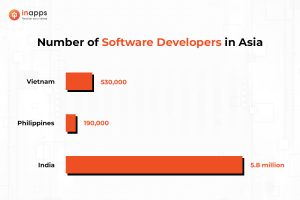Released in 1995, Java still remains one of the most popular programming languages in the world, as highlighted in the Stack Overflow Developer Survey 2023. According to the survey, Java is used by 30.55% of developers, placing it in a strong position among other widely used programming languages.

Most popular technologies by Stack Overflow Survey 2023
Why so? Java is a general-purpose language used for various applications, from web and mobile development to enterprise and scientific applications. Java code can run on all platforms that support Java without recompilation. Due to its stability and scalability, many large corporations rely on Java for their backend systems. As businesses continue to embrace digital transformation, the demand for skilled Java developers remains high.
Key Summary
This article from InApps.net provides a comprehensive guide to hiring offshore Java developers, leveraging Java’s enduring popularity (used by 30.55% of developers, per Stack Overflow 2023) for web, mobile, enterprise, and scientific applications. It details why and how to hire offshore developers, top regions, costs, and key considerations. Key points include:
- Why Hire Offshore Java Developers:
- Cost-Effectiveness: Significant savings compared to US rates ($10,000–$12,000/month) with Vietnam offering $800–$900/month (Glassdoor). Reduces overhead (office space, utilities).
- Scalability: Flexible team sizing for project demands, allowing quick onboarding or downsizing without long-term commitments.
- Global Talent Pool: Access diverse expertise (e.g., Asian developers for complex projects, Eastern European for enterprise apps) to match specific project needs.
- Top Regions for Hiring:
- Eastern Europe (Poland, Ukraine):
- Renowned for technical education (e.g., Warsaw University of Technology, Kyiv Polytechnic Institute).
- 700K+ tech professionals; strong in fintech, e-commerce, telecom.
- High performance in global coding contests (e.g., ICPC, Google Code Jam).
- Asia (Vietnam, India, Philippines):
- Vietnam: 530,000 IT professionals, 50,000 annual IT graduates.
- India: 5.8M developers, 1.5M new IT graduates yearly.
- Philippines: 190,000 developers.
- Salaries: $7,000–$12,000/year (Vietnam/Philippines: $9,000–$12,000; India: $7,000+).
- Latin America (Brazil, Argentina):
- Emerging hub with cost-effective, skilled talent (e.g., BairesDev partnerships).
- Strong problem-solving and enterprise app expertise, despite a smaller talent pool.
- Eastern Europe (Poland, Ukraine):
- How to Hire Offshore Java Developers:
- Define Project Needs: Specify project type (web, app, software), goals, and required skills (Java, Python, database management, web frameworks). Set budget and quality benchmarks.
- Choose Location: Balance cost, time zones, and cultural fit (e.g., India for low rates, Eastern Europe for technical rigor).
- Find Developers: Use outsourcing agencies, platforms (Upwork, Toptal, Freelancer), or LinkedIn networking for vetted talent.
- Engage Candidates: Assess skills, experience, and past projects via interviews or small tasks. Ensure cultural and communication alignment.
- Finalize Agreement: Negotiate payment terms, draft contracts detailing scope, deadlines, and deliverables. Use NDAs for security.
- Start Collaboration: Establish communication channels (email, video calls) and monitor progress with regular feedback.
- Cost of Offshore Java Developers:
- By Region:
- Eastern Europe: $25–$50/hour.
- India: $15–$35/hour.
- Southeast Asia (Vietnam, Philippines): $20–$40/hour.
- By Experience:
- Junior: $20–$40/hour.
- Mid-level: $40–$60/hour.
- Senior: $60–$80+/hour.
- Factors: Developer experience, project complexity, and engagement model (hourly, fixed-price, or dedicated team).
- By Region:
- Key Considerations:
- Communication/Time Zones: Schedule overlapping hours for meetings; use tools (e.g., Slack, Zoom) for asynchronous updates.
- Intellectual Property: Secure IP with NDAs and clear ownership clauses in contracts.
- Quality Assurance: Implement regular code reviews and testing to maintain standards.
- InApps Technology Advantages:
- Based in Vietnam, ranked #1 locally and #5 in Southeast Asia for app/custom software development.
- Offers cost-effective ($800–$900/month), skilled Java developers for diverse projects.
- Provides end-to-end services with transparent communication and agile methodologies.
- Trusted by 300+ global clients, specializing in scalable, high-quality solutions.
1. Why Hire Offshore Java Developers?
1.1 Cost-Effectiveness
Cost is often the first consideration for businesses considering Java offshore development. Hiring Java developers offshore can significantly reduce expenses without sacrificing quality. According to Glassdoor, the estimated total pay for a Java Developer in Vietnam is approximately $800 – $900 per month. In contrast, Java developers in the US make around $10,000-$12,000 a month.

Java developer’s salary in the US. ZipRecruiter
Besides, hiring offshore Java developers cuts operational costs. This is because offshore development eliminates the need for additional office space, utilities, and other overhead expenses. This means you can allocate more resources to other critical areas.
1.2 Scalability
Hiring offshore Java developers from offshore development companies allows you to scale up and down flexibly. If a project suddenly requires more resources, you can quickly onboard additional offshore developers. On the other hand, if demand decreases, you can reduce your staff quickly. So instead of maintaining a large in-house team with fluctuating workloads, you can hire offshore developers on a project basis.
1.3 Access to Global Java Developers
Offshore development gives you access to a vast and diverse pool of Java developers with varying skill sets and expertise. If you’re looking for Java developers in Asia, you’ll see Asian Java developers are well-suited for large-scale, complex projects because they have strong problem-solving skills and can adapt well. They typically excel in web and mobile application development.
Meanwhile, Eastern European Java developers have a technical foundation and attention to detail, ideal for enterprise-level applications. They frequently excel in Java frameworks and architectures. With strong English proficiency and a collaborative work culture, Eastern European developers often deliver high-quality projects within budget and timeline.
The ability to hire Offshore Java Developers from a global market ensures that you can find developers who match your project’s specific requirements, even if those skills are scarce locally.
2. Top Regions for Hiring Offshore Java Developers

2.1. Eastern Europe
Eastern Europe has established itself as a leading hub for hiring offshore Java developers. Countries like Poland and Ukraine are renowned for producing highly skilled Java engineers. This is largely because many universities in Poland and Ukraine rank highly in technical education. For example, the Warsaw University of Technology in Poland and the National Technical University of Ukraine “Igor Sikorsky Kyiv Polytechnic Institute” are renowned for their rigorous computer science programs.
Additionally, Eastern European countries consistently perform well in international programming contests like the ACM International Collegiate Programming Contest (ICPC) and Google Code Jam, further showcasing their exceptional technical expertise.
2.2. Asia
Asia is a vast region with a rapidly growing IT industry. Countries like Vietnam, India, and the Philippines offer a large pool of Java developers you can hire. Approximately 190,000 developers are currently residing in the Philippines. Vietnam boasts 530.000 IT professionals and 50,000 IT graduates every year. Lastly, India is home to 5.8 million developers and around 1.5 million IT graduates about to enter the workforce each year.

Besides, Asia provides cost-effective solutions for a wide range of Java projects. The average salaries for software developers in Asia are considerably lower than those in Western countries. According to Glassdoor, the average annual salary for a software developer in countries like Vietnam and the Philippines ranges between $9,000 to $12,000. In India, the average salary for a Java developer is at least $7,000.
2.3. Latin America
According to the Deloitte Global Outsourcing Survey, Latin America is an emerging outsourcing destination due to its growing technical talent and cost-effectiveness. Countries like Brazil and Argentina offer a blend of cost-efficiency and technical proficiency, particularly in enterprise application development.
Numerous businesses have reported positive experiences outsourcing to Latin America. For example, BairesDev, a leading software outsourcing company based in Argentina, has successfully partnered with companies worldwide.
While the talent pool may be smaller compared to Eastern Europe and Asia, Latin American developers often exhibit strong problem-solving skills and a dedication to project success.
3. How to Hire Offshore Java Developers
3.1 Know What You Need From Offshore Java Developers
The first step is to clearly understand your project requirements. Identify what you want to build, whether it’s a website, an app, or specific software. Define the main goals and functionalities of your project in detail. Once you have a clear vision, list the essential skills your offshore Java developers should possess.
For Java projects, proficiency in Java is a given, but you might also need expertise in other technologies like Python, database management, or web development, depending on the project’s scope. Setting a budget is also crucial at this stage. Determine how much you can afford to spend on your project to help narrow down your options when hiring developers.
3.2 Choose a Place to Hire Offshore Java Developers
Next, decide on the geographical location to hire your offshore developers. Popular regions include India, Eastern Europe (such as Poland and Ukraine), and parts of Asia. These areas are known for their large pool of skilled developers.
Consider the cost differences among these regions, as some places might offer more affordable rates. Additionally, think about the time zone differences. If your working hours significantly differ from your offshore developers, it could impact communication and project timelines. Finding a balance that suits your budget and working style is essential.
3.3 Find Offshore Java Developers
There are several ways to find qualified offshore Java developers. Consider offshore outsourcing agencies specializing in Java development. These firms often have a rigorous vetting process, ensuring you get high-quality talent. Online platforms like Upwork, Toptal, and Freelancer are also excellent resources where you can browse profiles, read reviews, and view previous work. Networking can also be valuable. Reach out to friends or colleagues on Linkedin who might have recommendations.
3.4 Reach out to Offshore Java Developers
Once you have a shortlist of potential developers, it’s time to communicate with them directly. Ask about their skills, experience, and past projects to gauge their capabilities. To further assess their proficiency, give them a small task or project. This practical test can reveal their problem-solving skills and technical expertise. It’s also important to ensure a good working relationship. Check if their communication style and work approach align with your team’s culture and expectations.
3.4 Make a Deal
After selecting the right developer or team, negotiate the terms of your agreement. Discuss and finalize the payment structure, ensuring it fits within your budget. Draft a contract that clearly outlines the scope of work, deadlines, payment terms, and any other relevant details. This legal document is crucial to protect both parties and set clear expectations. Be specific about what you want your offshore Java programmers to achieve, including detailed descriptions of deliverables and timelines.
3.5 Start Working With Your Java Engineers
With everything set, establish clear communication channels such as email, video calls, or messaging apps to ensure regular and effective communication. Monitor the work regularly to ensure it meets your standards and project requirements.
Also, provide constructive feedback, highlighting both the strengths and areas for improvement. This ongoing dialogue helps align their work with your expectations and fosters a productive working relationship. Remember, finding the right offshore developers takes time. Be patient and do your research.
4. How much do offshore Java programmers charge per hour?

The hourly rate for a Java programmer can vary significantly based on several factors:
- Developer experience: Senior developers typically charge more than junior developers.
- Project complexity: Complex projects may require higher rates due to specialized skills.
- Engagement model: Hourly rates, fixed-price contracts, or dedicated teams can affect pricing.
To give you a general idea, here’s a rough estimate:
| Location | Experience |
|
|
5. Key Considerations Before Hiring Offshore Java Developers

5.1 Communication and Time Zone Differences
Time zone differences between Singapore and Vietnam can be tricky. The key is overlap. Schedule meetings when both teams are awake. Use online tools for quick messages when it’s the night for one side. Most importantly, be flexible with your work hours to accommodate each other.
5.2 Intellectual Property Protection
Protecting your intellectual property is paramount. Ensure you have robust legal agreements in place that clearly define ownership rights and confidentiality obligations. Consider using non-disclosure agreements (NDAs) to safeguard sensitive information.
5.3 Quality Assurance and Control
Let’s create the next big thing together!
Coming together is a beginning. Keeping together is progress. Working together is success.

















